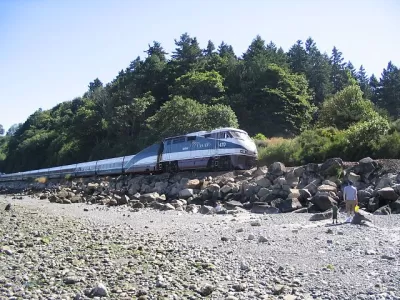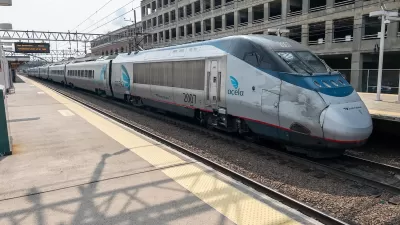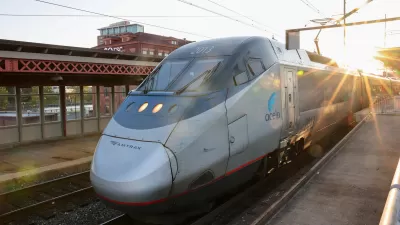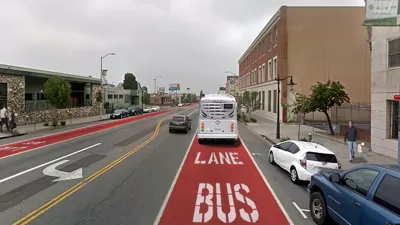Language in the new infrastructure bill calls for the agency to prioritize ridership and service levels over profitability.

"2021 will be a defining moment for the future of passenger rail in America," writes Jake Blumgart. "Amtrak faces huge challenges, but the systemic changes to travel and work life wrought by the pandemic also present an opportunity to fundamentally rethink how the agency operates." Meanwhile, the new infrastructure bill "could allow Amtrak’s executives to make paradigm-shifting operational changes — placing ridership over revenues and faster speeds over minimizing costs."
"In a country where transportation is the largest source of greenhouse emissions, there is no cleaner way to travel than by train." But the business travel that was the lifeblood of Amtrak's Northeast Corridor services "remains severely constrained," and prohibitively expensive fares lead travelers to choose driving instead. Outside of the Northeast Corridor, it isn't the cost but rather "the infrequency and unreliability of the trains that makes Amtrak uncompetitive."
Part of the problem, says Blumgart, is Amtrak's history: "the legislation creating Amtrak specifies that it should be operated and managed as a for-profit service, something that no other country’s rail network requires or accomplishes." According to Amtrak public relations manager Kimberly Woods, "[b]ecause Amtrak is operated as a for-profit company and is required by law to maximize revenues, its fares vary based upon demand, like airlines and intercity buses." The revised mandate proposed in the infrastructure bill "would get rid of the Nixon-era language about minimizing subsidies and instead refocus the agency’s mission on expanding passenger rail capacity and adding ridership," giving it more flexibility to experiment with fare structures. "Just as owners of office buildings and commuter rail lines are being forced to grapple with a new reality, perhaps changes to ridership wrought by the pandemic will force policymakers to change."
FULL STORY: Will Amtrak Make Fares Cheaper as Business Travel Drops?

Alabama: Trump Terminates Settlements for Black Communities Harmed By Raw Sewage
Trump deemed the landmark civil rights agreement “illegal DEI and environmental justice policy.”

Planetizen Federal Action Tracker
A weekly monitor of how Trump’s orders and actions are impacting planners and planning in America.

How Atlanta Built 7,000 Housing Units in 3 Years
The city’s comprehensive, neighborhood-focused housing strategy focuses on identifying properties and land that can be repurposed for housing and encouraging development in underserved neighborhoods.

In Both Crashes and Crime, Public Transportation is Far Safer than Driving
Contrary to popular assumptions, public transportation has far lower crash and crime rates than automobile travel. For safer communities, improve and encourage transit travel.

Report: Zoning Reforms Should Complement Nashville’s Ambitious Transit Plan
Without reform, restrictive zoning codes will limit the impact of the city’s planned transit expansion and could exclude some of the residents who depend on transit the most.

Judge Orders Release of Frozen IRA, IIJA Funding
The decision is a victory for environmental groups who charged that freezing funds for critical infrastructure and disaster response programs caused “real and irreparable harm” to communities.
Urban Design for Planners 1: Software Tools
This six-course series explores essential urban design concepts using open source software and equips planners with the tools they need to participate fully in the urban design process.
Planning for Universal Design
Learn the tools for implementing Universal Design in planning regulations.
Jessamine County Fiscal Court
Caltrans
Institute for Housing and Urban Development Studies (IHS)
City of Grandview
Harvard GSD Executive Education
Toledo-Lucas County Plan Commissions
Salt Lake City
NYU Wagner Graduate School of Public Service





























